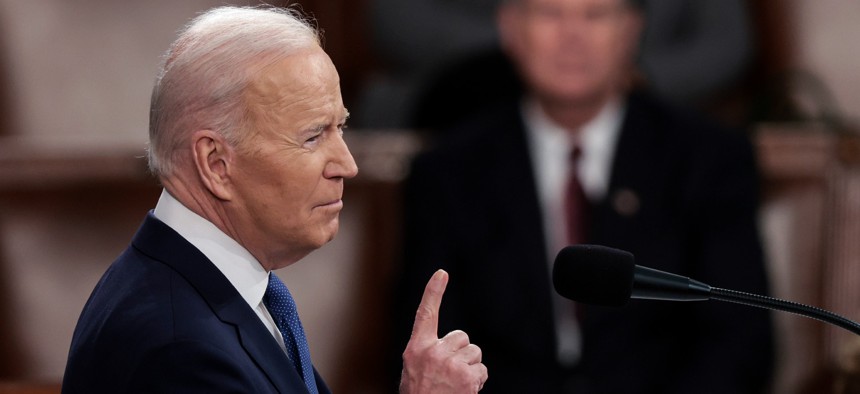Coming ID order should focus on digital credentials, say trade groups

President Biden announced plans to combat pandemic benefits fraud in his March 1, 2022 State of the Union speech. Win McNamee/Getty Images
Standards for mobile driver's licenses top the wish list of groups looking to steer the direction of the administration’s action on combating identity theft and fraud.
The government should combat identity theft by encouraging the development and use of digital mobile driver's licenses and identity attribute validation services by agencies, according to a letter to Biden administration officials from six technology trade groups.
In his State of the Union speech, President Joe Biden pledged to combat fraud in benefits delivery, and according to a White House fact sheet, those efforts include a coming executive order covering identity theft.
In an April 13 letter, six industry groups, including the Better Identity Coalition, the Cybersecurity Coalition and the Technology Engagement Center at the U.S. Chamber of Commerce, urged administration leaders to equip Americans with new tools to protect against identity theft.
The groups want the administration to accelerate the development of mobile driver's licenses (mDLs), promulgate standards for their security and focus on their use in digital identity proofing rather than as a credential for use in transportation. Early use cases are developing the digital IDs as a substitute for physical identity documents to get through airport security.
"The most urgent problems mDLs can solve are focused in the digital world," the letter states.
The letter states that if mDLs had been widely used at the start of the pandemic, "federal and state agencies could have easily used them to securely and remotely verify the identities of applicants for benefits, and prevented the vast majority of identity theft and fraud," which is estimated in the hundreds of billions of dollars over the last two years.
Additionally, the groups want the government to focus on making identity attribute validation services available to the private sector. Currently, the Social Security Administration allows participating financial institutions to validate identity information against SSA data using a system called Consent Based Social Security Number Verification (eCBSV). However, government agencies can't tap into this service to validate the SSNs of applicants for benefits. Private companies outside the financial sector are also shut out – something the groups behind the letter would like to see changed.
The groups are seeking a "governmentwide approach" so that agencies that collect and manage identity data can provide the kind of yes/no validation used in the eCBSV service to assist in digital identity proofing and "enable them to be accessed with uniform fees and terms by the public and private sector."
The groups also want to offer Americans a "one-stop shop" that provides support for victims of identity crime as well as assistance for those who have been left out of the identity infrastructure established by the strict requirements of the REAL ID Act of 2005 – including the elderly, youth in foster care, people exiting incarceration and others who may not have access to the documentation required to obtain a state or territorial identification credential due to the restrictions of the post-9/11 legislation.



